149+ Impactful ChatGPT Prompts for Thesis Writing to Achieve Success
Ever wondered how to make your thesis writing process more engaging and creative? Here’s what you need! Introducing the ChatGPT Prompts for Thesis Writing. These custom-built ChatGPT prompts are designed to spark creativity and provide you with unique ideas and insights for your thesis. With a simple phrase or instruction, you can unlock the potential of the ChatGPT AI model to generate responses that will enhance your thesis writing experience.
Are you struggling to come up with compelling thesis statements for your writing assignments? Do you find yourself staring at a blank page, unsure of how to kickstart your thesis writing process? This is the place to be! ChatGPT Prompts for Thesis Writing is here to help you overcome this challenge by providing you with engaging and effective prompts that will guide you in crafting a strong thesis statement for your academic papers.
Get ready to unleash your creativity and conquer your thesis writing woes with ChatGPT Prompts for Thesis Writing. Say goodbye to writer’s block and dive into a realm of effortless inspiration and expert guidance, as you craft a masterpiece that will impress your professors and leave a lasting impact.
How ChatGPT Prompts for Thesis Writing Offers Help on Efficient Writing
ChatGPT Prompts for Thesis Writing are important because they provide a time-saving solution for busy professionals in the AI landscape. With an understanding of the potential of AI but lacking the time and expertise to optimize prompts, these professionals can benefit from pre-built prompts. By utilizing ChatGPT prompts, they can save time, energy, and the hassle of crafting optimized prompts, allowing them to focus on their thesis writing.
ChatGPT Prompts for Thesis Writing benefit professionals by offering a solution that saves them time and energy. With pre-built prompts, professionals can ensure that their ideas are conveyed flawlessly, boosting their effectiveness and making them stand out in a crowded digital space. By utilizing ChatGPT prompts, professionals can confidently navigate the thesis writing process, knowing that their ideas are conveyed clearly and efficiently.
Get a Clear Understanding with ChatGPT’s Premier Prompt For Thesis Writing
Act as a Thesis Writing Expert. You will help me from selecting a topic for my thesis to writing briefly on it.
What are some potential topics in the field of [insert field]? Can you suggest some possibilities? What are some current research trends or topics in this area? I have a general idea about [insert topic]. Can you brainstorm some specific research questions related to this? I’m having trouble coming up with a research question on [insert topic]. Suggest different perspectives or subtopics within this? Only suggest some topics with subtopics in your first response. I will choose one of those suggested topics. Then, you will write your response according to my selected topic.
Once I finalize the topic, move ahead and explain the key points for writing the thesis related to my topic. For example, tell me a list of all the necessary things which I need to consider from starting to end while writing my thesis.
After you provide me with the list, I will Ok it.
Now, in your next response, Explain briefly What are the key factors influencing my selected topic and how do they impact [relevant field]?
Then, in your next response, Explain the historical significance of this topic and its implications. Also, Discuss the ethical considerations associated with [issue] and propose potential solutions.
After that, in the next response, Share Strategies for conducting a comprehensive literature review and how to identify conflicting views or debates in the literature.
After that, in the next response, Explain to me How I can make my thesis statement stronger by integrating a problem statement into this related to my topic.
Then, in the next response, tell me What is the most suitable methodology for studying my topic?
After that, explain to me How I can approach this topic from a theoretical framework perspective. Also share with me, Are there any conflicting views or debates in the literature on my topic]?
Then, in the next response, Discuss how I can explain the implications of my results effectively?
Now, in the next response, assist me how to interpret data findings?
I need to summarize the main findings of these research papers. How to synthesize them?
Can you help me explore the potential implications of my topic]?
How can I ensure the academic integrity of my thesis?
How can I improve the academic writing style in my thesis? So, you will explain to me all of these questions related to the thesis. But you will not explain all the questions in one response. Just tackle one question at a time. Once I am ok with the response then you can move towards the next question.
How to Use Master Prompt: Add values in insert spaces according to your requirements. This prompt is covering everything related to the thesis but not in one response. First it will suggest topics/subtopics/questions. You will select from these and tell it to ChatGPT what you have chosen? Then it will elaborate on the next part, you will give feedback. Once you are satisfied, tell ChatGPT “OK”, then it will explain the next step and so on.
4 Powerful ChatGPT Prompts for Captivating Thesis Writing
1. Exploring Potential Research Topics:
Act as a Thesis Writing Expert. You will help me select a topic for my thesis to write briefly on it.
What are some potential topics in the field of [insert field]? Can you suggest some possibilities? What are some current research trends or topics in this area? I have a general idea about [insert topic]. Can you brainstorm some specific research questions related to this? I’m having trouble coming up with a research question on [insert topic]. Suggest different perspectives or subtopics within this? Only suggest some topics with subtopics.
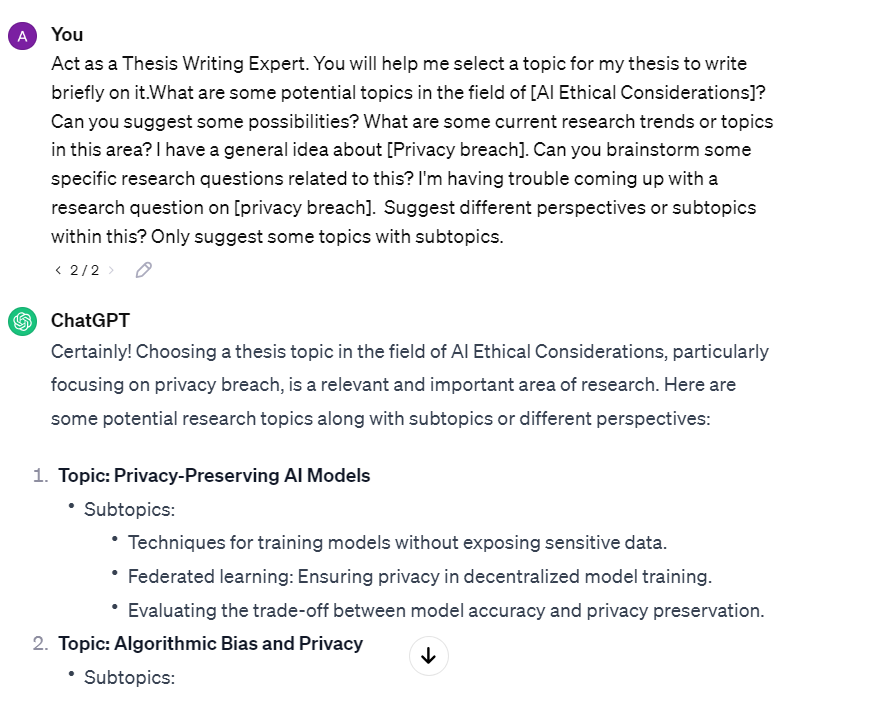
2. Crafting a Strong Thesis Statement:
I’m having trouble coming up with a research question on [insert topic]. Can you brainstorm some specific research questions related to this? Suggest different perspectives or subtopics within this. Explain to me How I can make my thesis statement stronger by integrating a problem statement and questions into this related to my topic.
3. Key Factors and Historical Significance:
Explain the key factors influencing my [insert topic] and how they impact [relevant field]. Discuss the historical significance of this topic and its implications.
4. Conducting a Comprehensive Literature Review:
My topic for research is [insert topic] and it is related to the [insert field]. Share strategies for conducting a comprehensive literature review on my topic and how to identify conflicting views or debates in the literature.
149+ Impactful ChatGPT Prompts for Captivating Thesis Writing
Topic Exploration:
- What factors should be considered when selecting a research topic in [insert field]?
- How can emerging trends in [insert field] inspire innovative thesis topics?
- Discuss the importance of choosing a relevant and timely research topic for a thesis.
Research Question Formulation:
- Explore different methods for formulating clear and concise research questions.
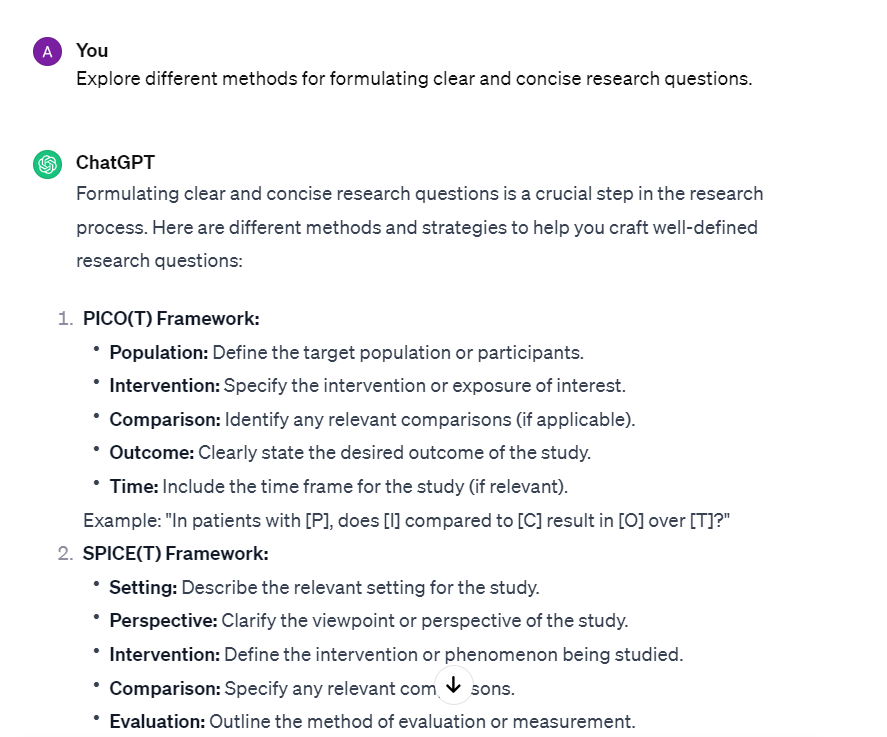
5. How can a researcher identify gaps in existing literature to formulate research questions?
6. Discuss the significance of having specific, measurable, and achievable research questions.
Literature Review Strategies:
- What are effective strategies for conducting a literature review in preparation for a thesis?
- How to organize and synthesize information from diverse sources in a literature review?
- Discuss the role of a literature review in shaping the research direction of a thesis.
Thesis Statement Development:
- Explore techniques for crafting a compelling and focused thesis statement.
- How can a problem statement be integrated to strengthen a thesis statement?
- Discuss the importance of aligning the thesis statement with the research questions.
Methodology Selection:
- Compare and contrast different research methodologies applicable to [insert field].
- How to determine the most suitable research methodology for a specific thesis topic?
- Discuss the significance of ethical considerations in selecting a research methodology.
Theoretical Framework:
- Explore the role of a theoretical framework in guiding thesis research.
- Discuss common theoretical frameworks used in [insert field] and their applications.
- How can a researcher integrate and justify a theoretical framework in their thesis?
Data Collection and Analysis:
- Discuss strategies for effective data collection and analysis in thesis research.
- How to address potential challenges in data collection and ensure data reliability?
- Explore the role of technology in enhancing data collection and analysis processes.
Results Interpretation:
- How can researchers effectively interpret and present their thesis findings?
- Discuss strategies for dealing with unexpected or inconclusive results.
- Explore the balance between objective presentation and interpretation of results.

Implications of Research:
- Explore methods for discussing the broader implications of thesis research.
- How to connect thesis findings with real-world applications and significance?
- Discuss the importance of considering potential societal or industry impacts.
Academic Integrity:
- How can a researcher ensure academic integrity throughout the thesis writing process?
- Discuss common pitfalls and best practices for avoiding plagiarism in a thesis.
- Explore the ethical responsibilities of a researcher in presenting research findings.
Research Design and Sampling:
- Discuss the importance of a well-designed research study in thesis research.
- How can a researcher address issues related to sampling and generalizability?
Data Presentation:
- Explore effective ways to visually present data in a thesis.
- Discuss the role of tables, charts, and graphs in enhancing data representation.
Survey and Questionnaire Design:
- What considerations should be taken into account when designing surveys for thesis research?
- Discuss common challenges in questionnaire design and strategies for overcoming them.
Critical Analysis of Existing Literature:
- How can a researcher critically evaluate and analyze existing literature in a thesis?
- Discuss the importance of identifying biases and limitations in literature.
Citing Sources and Referencing:
- Explore proper citation styles and techniques for referencing in a thesis.
- Discuss common errors to avoid in citing sources and maintaining consistency.
Aligning Research Objectives:
- How can a researcher ensure that research objectives align with the overall thesis goal?
- Discuss strategies for refining research objectives throughout the research process.
Thesis Structure and Organization:
- Explore effective ways to structure and organize different sections of a thesis.
- Discuss the role of introductory and concluding sections in a thesis.
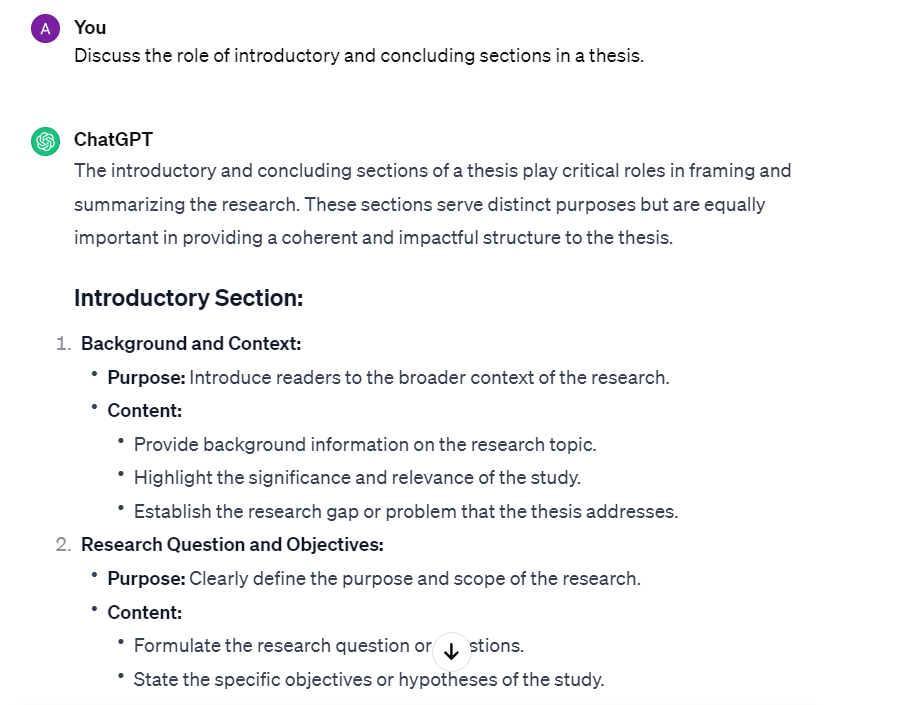
Utilizing Technology in Research:
- How can technology enhance the efficiency and accuracy of thesis research?
- Explore the role of software tools in data analysis, literature review, and thesis writing.
Balancing Objectivity and Subjectivity:
- Discuss the challenges of maintaining objectivity in qualitative research for a thesis.
- Explore the role of the researcher’s perspective in shaping the thesis narrative.
Feedback and Revision:
- How can a researcher effectively incorporate feedback from advisors and peers?
- Discuss strategies for revising and improving a thesis based on constructive feedback.
Time Management in Thesis Writing:
- Explore effective time management strategies for the various stages of thesis writing.
- Discuss the importance of setting realistic timelines and milestones.
Collaborative Research:
- How can collaborative research contribute to the quality and depth of a thesis?
- Explore the challenges and benefits of working with other researchers on a thesis project.
Incorporating Interdisciplinary Perspectives:
- Discuss the advantages of incorporating interdisciplinary perspectives in a thesis.
- Explore challenges and strategies for integrating insights from different fields.
Ethical Dilemmas in Research:
- Explore common ethical dilemmas faced by researchers in [insert field].
- Discuss strategies for addressing ethical challenges and maintaining research integrity.
Writing Style and Clarity:
- How can a researcher improve the clarity and readability of their thesis writing?
- Discuss strategies for conveying complex ideas in a straightforward manner.
Preparing for Oral Defense:
- Explore effective ways to prepare for and navigate the oral defense of a thesis.
- Discuss common questions and concerns raised during thesis defenses.
Publication and Dissemination:
- What are the steps involved in preparing a thesis for publication?
- Discuss strategies for disseminating thesis findings through conferences and journals.
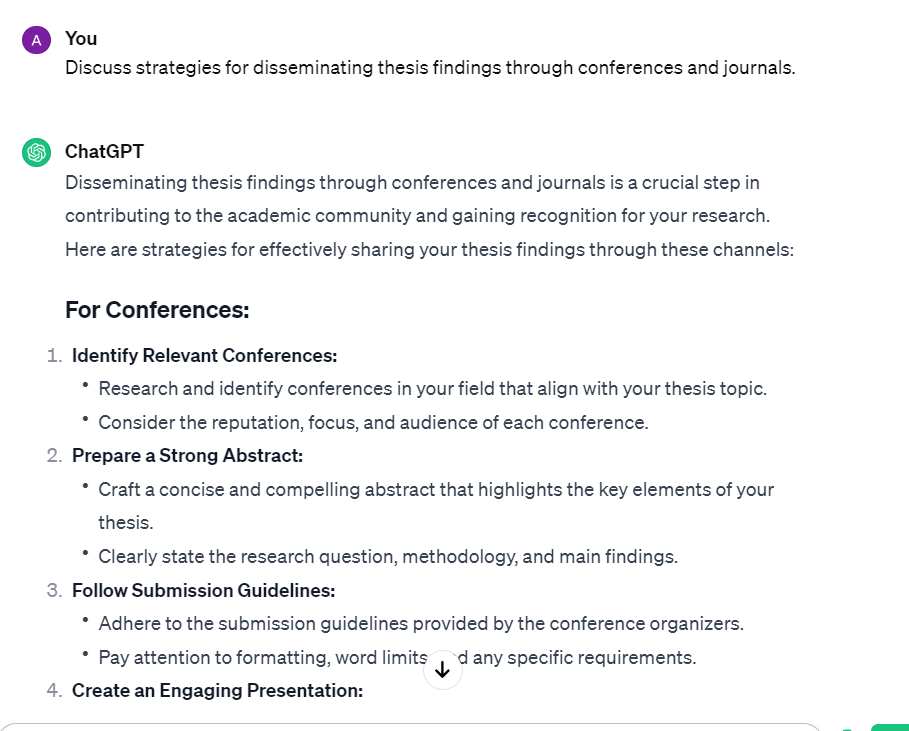
Reflecting on the Research Process:
- How can a researcher reflect on their experiences and lessons learned during the thesis process?
- Explore the value of self-reflection in improving future research endeavors.
Cross-Cultural Considerations in Research:
- Discuss the challenges and benefits of conducting cross-cultural research for a thesis.
- Explore strategies for addressing cultural biases and ensuring cultural sensitivity.
Adapting to Unexpected Challenges:
- How can a researcher effectively navigate unexpected challenges that may arise during the thesis process?
- Discuss strategies for adapting research plans in response to unforeseen obstacles.
Exploring Alternative Methodologies:
- Discuss the advantages and challenges of using alternative research methodologies in [insert field].
- How can a researcher justify the choice of a non-traditional methodology in their thesis?
Multidisciplinary Approaches in Thesis Research:
- Explore the benefits of incorporating insights from multiple disciplines in a thesis.
- Discuss challenges and strategies for maintaining cohesion in a multidisciplinary thesis.
Utilizing Primary and Secondary Data:
- How can a researcher effectively combine primary and secondary data in their thesis?
- Discuss the role of each type of data in contributing to a comprehensive thesis.
Addressing Bias in Thesis Research:
- Explore strategies for identifying and mitigating potential biases in research.
- Discuss the ethical considerations associated with bias and how to address them.
Maintaining Consistency in Argumentation:
- How can a researcher ensure consistency in argumentation and logic throughout a thesis?
- Discuss the importance of clear transitions between sections and chapters.
Digital Tools for Thesis Writing:
- Explore the role of digital tools in organizing, writing, and editing a thesis.
- Discuss the benefits of using reference management software in thesis writing.
Case Study Methodology:
- How can a researcher effectively design and analyze a case study for a thesis?
- Discuss the strengths and limitations of the case study approach in thesis research.
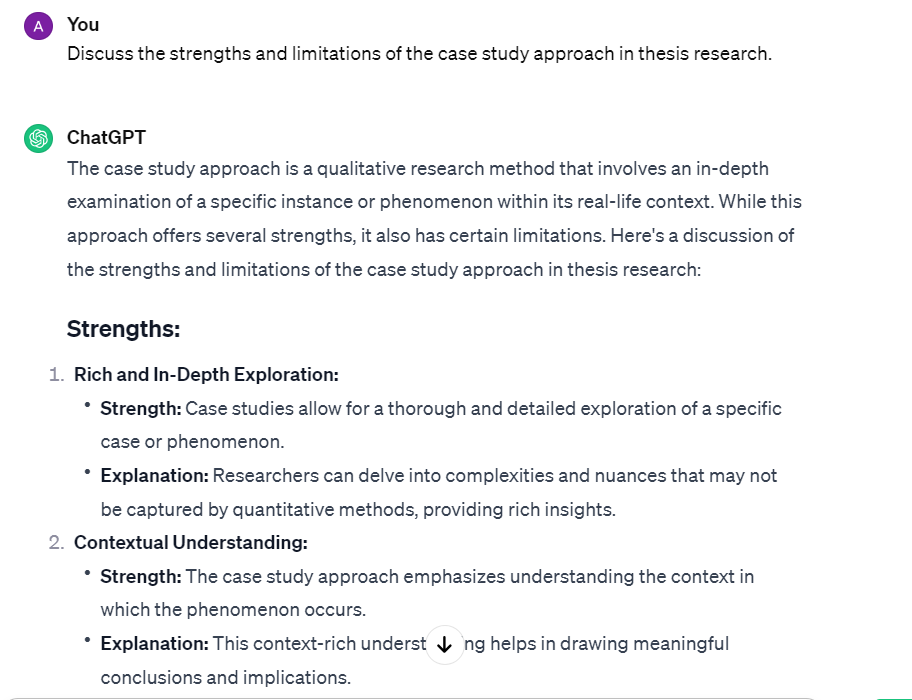
Exploring Quantitative Analysis Techniques:
- Discuss common quantitative analysis techniques applicable to [insert field].
- Explore considerations for choosing the most suitable statistical methods for thesis research.
Building a Theoretical Foundation:
- How can a researcher build a strong theoretical foundation for their thesis?
- Discuss strategies for integrating theoretical concepts into different sections of the thesis.
Comparative Analysis in Thesis Research:
- Explore the process of conducting a comparative analysis in a thesis.
- Discuss the significance of identifying similarities and differences in comparative research.
Overcoming Writer’s Block:
- Explore strategies for overcoming writer’s block during different stages of thesis writing.
- Discuss the importance of maintaining a consistent writing routine.
Community Engagement in Thesis Research:
- How can a researcher engage with the community to enhance the impact of their thesis?
- Discuss ethical considerations when involving the community in research.
Exploring Archival Research:
- Discuss the value of archival research in contributing to a thesis.
- Explore challenges and strategies for accessing and analyzing archival materials.
Incorporating Visual Elements:
- How can visual elements such as images, diagrams, and graphs enhance a thesis?
- Discuss guidelines for effectively integrating visual elements into different sections.
Dealing with Conflicting Findings:
- Explore strategies for addressing conflicting findings in thesis research.
- Discuss the importance of transparently presenting conflicting results and their implications.
The Role of Hypotheses:
- How can hypotheses strengthen the structure and focus of a thesis?
- Discuss considerations for formulating and testing hypotheses in [insert field].
Digital Humanities in Thesis Research:
- Discuss the role of digital humanities tools and methods in thesis research.
- Explore the potential impact of technology on shaping research questions and methodologies.
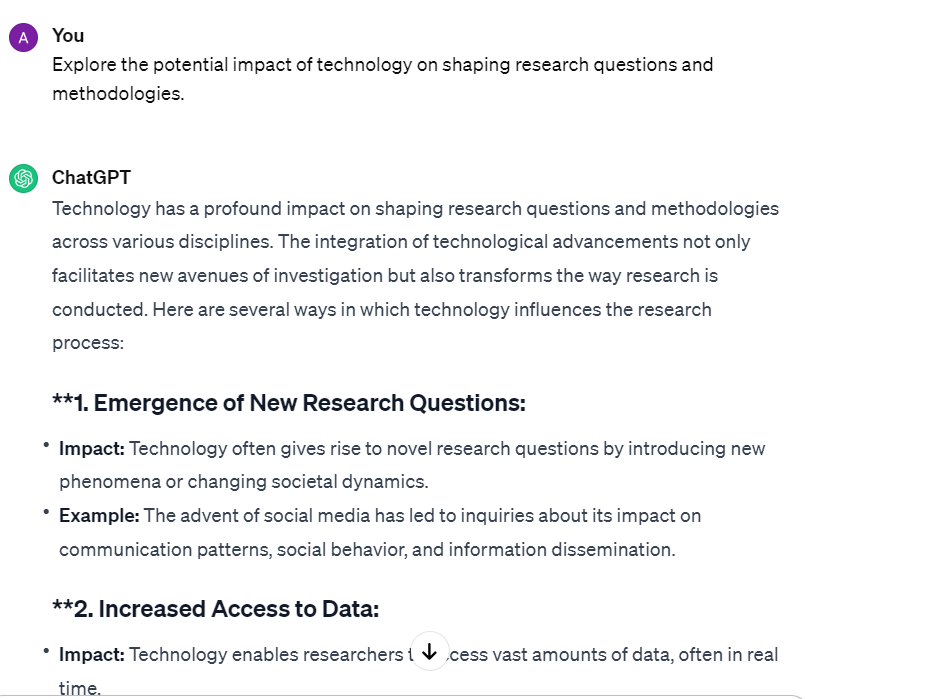
Incorporating Personal Reflection:
- How can a researcher incorporate personal reflections in a thesis without compromising objectivity?
- Discuss the balance between personal insights and scholarly detachment in thesis writing.
The Intersection of Theory and Practice:
- Explore how a thesis can bridge theoretical concepts with practical applications.
- Discuss challenges and strategies for translating theoretical insights into actionable recommendations.
Utilizing Mixed-Methods Research:
- Discuss the benefits and challenges of employing mixed-methods research in a thesis.
- Explore how combining qualitative and quantitative approaches can enrich thesis findings.
Cultural Sensitivity in Data Collection:
- How can a researcher ensure cultural sensitivity when collecting data for a thesis in [insert field]?
- Discuss potential challenges and solutions for cross-cultural research.
Exploring Longitudinal Studies:
- Discuss the benefits and challenges of conducting longitudinal studies for a thesis.
- Explore considerations for maintaining participant engagement over an extended period.
The Role of Peer Review:
- How does the peer review process contribute to the refinement of a thesis?
- Discuss strategies for seeking and incorporating peer feedback during the writing process.
Navigating Intellectual Property Issues:
- Explore considerations related to intellectual property in thesis research.
- Discuss strategies for respecting copyright and intellectual property rights.
Utilizing Big Data in Thesis Research:
- Discuss the potential applications and challenges of using big data in [insert field] thesis research.
- Explore ethical considerations associated with big data analysis.
Exploring Action Research:
- How can action research be applied to address practical issues in [insert field] for a thesis?
- Discuss the iterative nature of action research and its implications for thesis writing.
Incorporating Theoretical Debates:
- Explore theoretical debates within [insert field] and their relevance to your thesis.
- Discuss how acknowledging and engaging with theoretical debates can strengthen your argument.
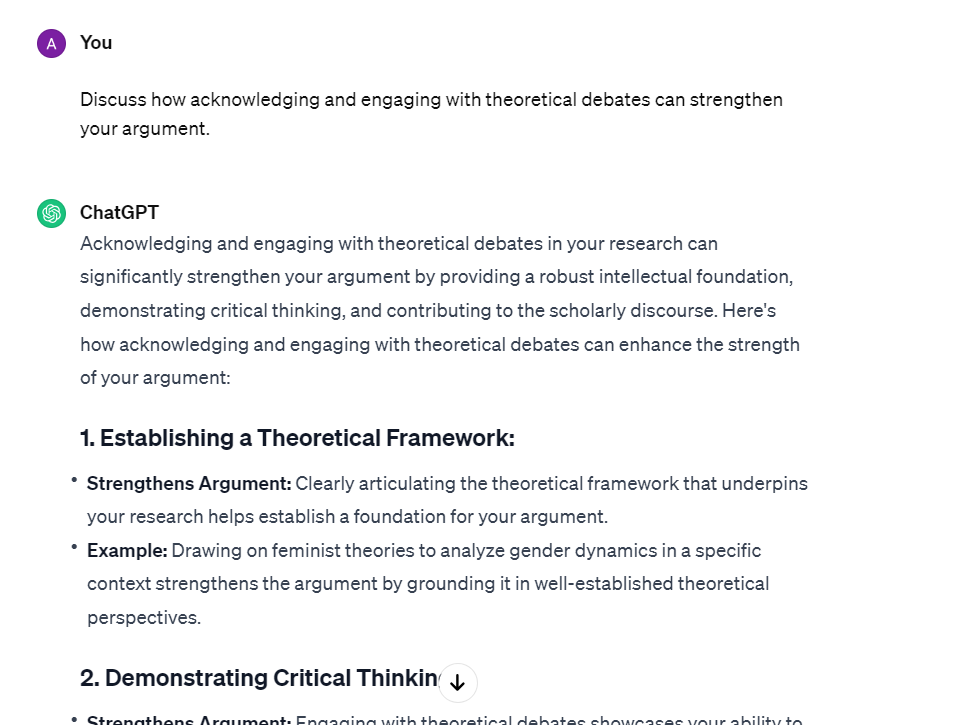
Thesis Writing in a Digital Age:
- How has the digital age influenced the process and presentation of thesis research?
- Discuss the role of online platforms and digital tools in thesis dissemination.
Exploring Autoethnography:
- Discuss the potential benefits and challenges of employing autoethnography in a thesis.
- Explore considerations for maintaining rigor and reflexivity in autoethnographic research.
Interdisciplinary Collaboration Challenges:
- What challenges may arise in interdisciplinary collaboration for thesis research?
- Discuss strategies for effective communication and collaboration across disciplines.
Comparing Qualitative and Quantitative Approaches:
- Compare the strengths and limitations of qualitative and quantitative research approaches for a thesis.
- Explore considerations for choosing the most appropriate approach based on research goals.
Enhancing Thesis Accessibility:
- How can a researcher ensure that their thesis is accessible to a diverse audience?
- Discuss strategies for presenting complex ideas in a way that is understandable to a broad readership.
Incorporating Public Engagement:
- Explore ways to engage the public in thesis research and disseminate findings.
- Discuss ethical considerations when involving the public in research.
Navigating Institutional Review Board (IRB) Processes:
- What is the role of the Institutional Review Board (IRB) in thesis research, and how can researchers navigate the approval process?
- Discuss common ethical considerations and pitfalls in the IRB process.
The Role of Meta-analysis:
- Discuss the advantages and challenges of conducting a meta-analysis for a thesis.
- Explore considerations for synthesizing and interpreting findings across multiple studies.
Addressing Research Limitations:
- How can a researcher transparently address and mitigate limitations in their thesis?
- Discuss the importance of acknowledging constraints and their impact on results.
Strategies for Effective Collaboration with Advisors:
- Explore strategies for building a productive and supportive relationship with thesis advisors.
- Discuss effective communication and feedback mechanisms between researchers and advisors.
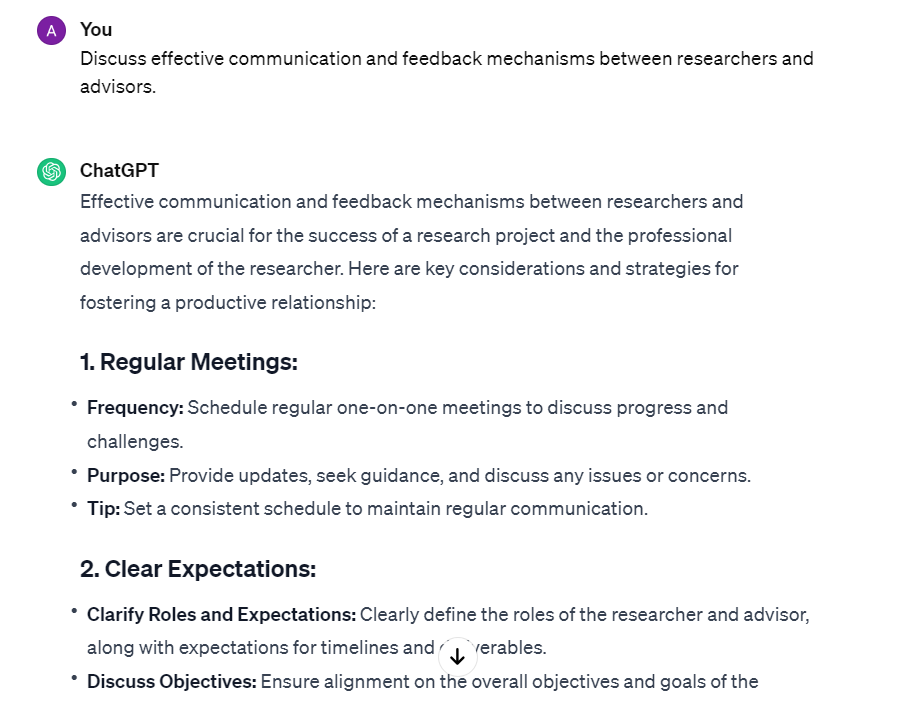
Exploring Phenomenological Research:
- Discuss the application of phenomenology in thesis research.
- Explore considerations for capturing and interpreting lived experiences in a thesis.
The Intersection of Gender and Research:
- How can a researcher ensure gender sensitivity in thesis research?
- Discuss the impact of gender biases on research design and interpretation.
Narrative Inquiry in Thesis Writing:
- Discuss the principles and applications of narrative inquiry in a thesis.
- Explore strategies for maintaining ethical standards in narrative research.
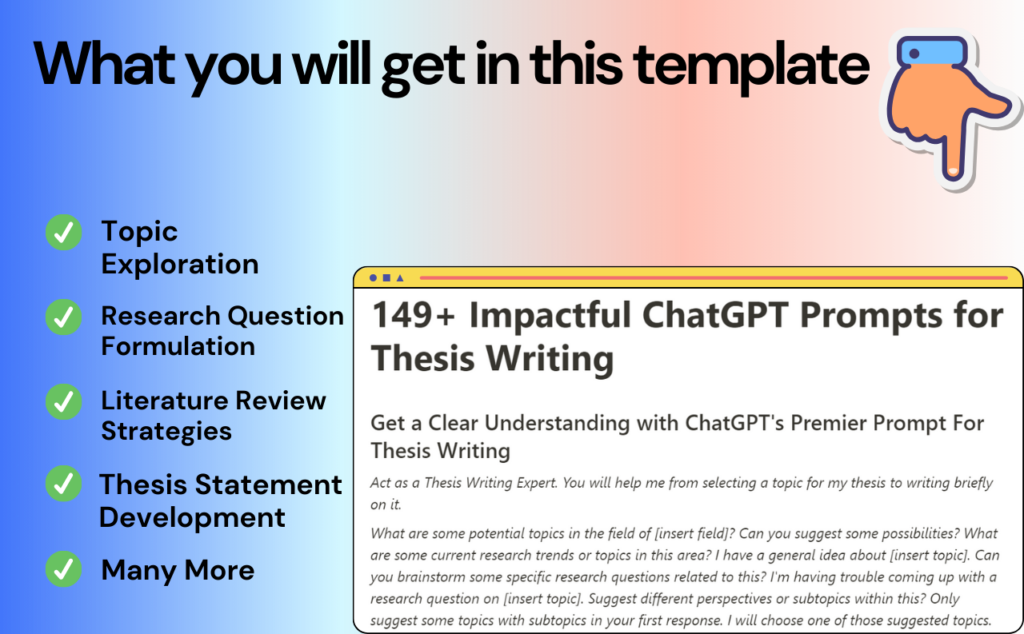
Get 149+ ChatGPT Prompts for Thesis Writing – Complete List Here!
Free Prompts forever – Complete Thesis Writing Prompts List

Final Thoughts:
By offering pre-built ChatGPT prompts, We provide a solution that saves busy professionals in the AI landscape time, energy, and the hassle of crafting optimized prompts. With tailored prompts, complex tasks become simple, and error-free writing becomes achievable. So, why wait? Start using ChatGPT prompts today and watch your writing flourish effortlessly. Happy writing!

